Are you tired of crows wreaking havoc in your yard? Well, we’ve got some handy tricks up our sleeves to keep those pesky birds away. In this article, we unveil the top 10 smells crows hate. These strong scents make crows think twice before invading your space. These scents might just be the secret weapon you’ve been searching for to reclaim your peaceful yard. From the refreshing aroma of peppermint to the pungent power of garlic, we explore a range of natural deterrents that are sure to make those crows head for the hills. So, get ready to banish those feathered intruders and create a crow-free haven. Let’s dive into the aromatic world of crow repellents and bid farewell to these notoriously loud birds!
1. Peppermint
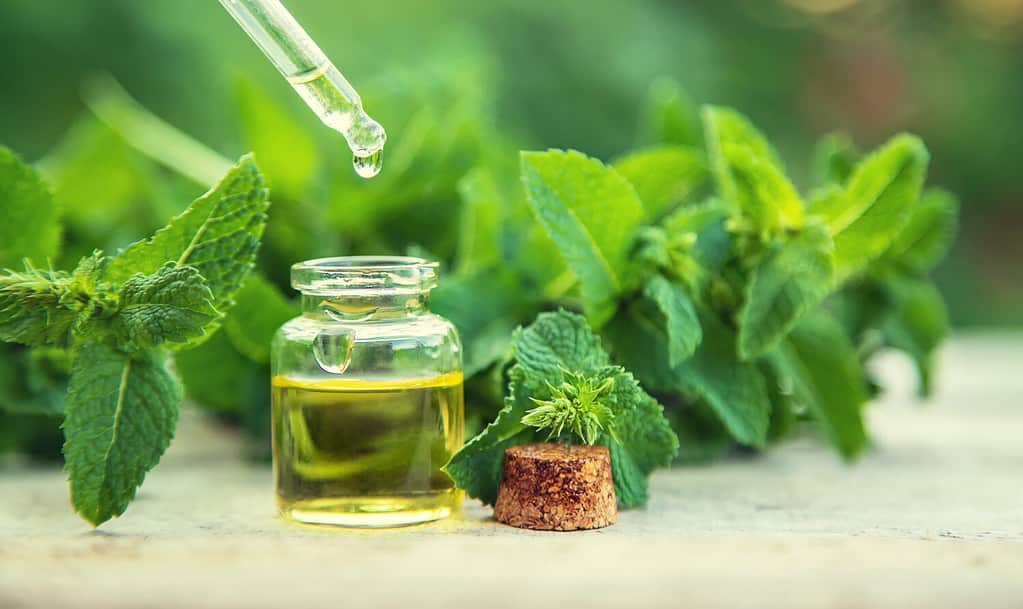
The aroma of peppermint is known to deter crows.
©Tatevosian Yana/Shutterstock.com
Peppermint is known to repel crows due to its strong and invigorating aroma. The scent overwhelms their sensitive senses, making them steer clear of areas where peppermint is present. The refreshing fragrance acts as a natural deterrent, creating an inhospitable environment for crows. It’s like a breath of fresh air that repels those bothersome birds and keeps them from invading your space. Incorporating peppermint in your yard or garden can help maintain a crow-free zone, allowing you to enjoy a peaceful outdoor environment.
2. Garlic
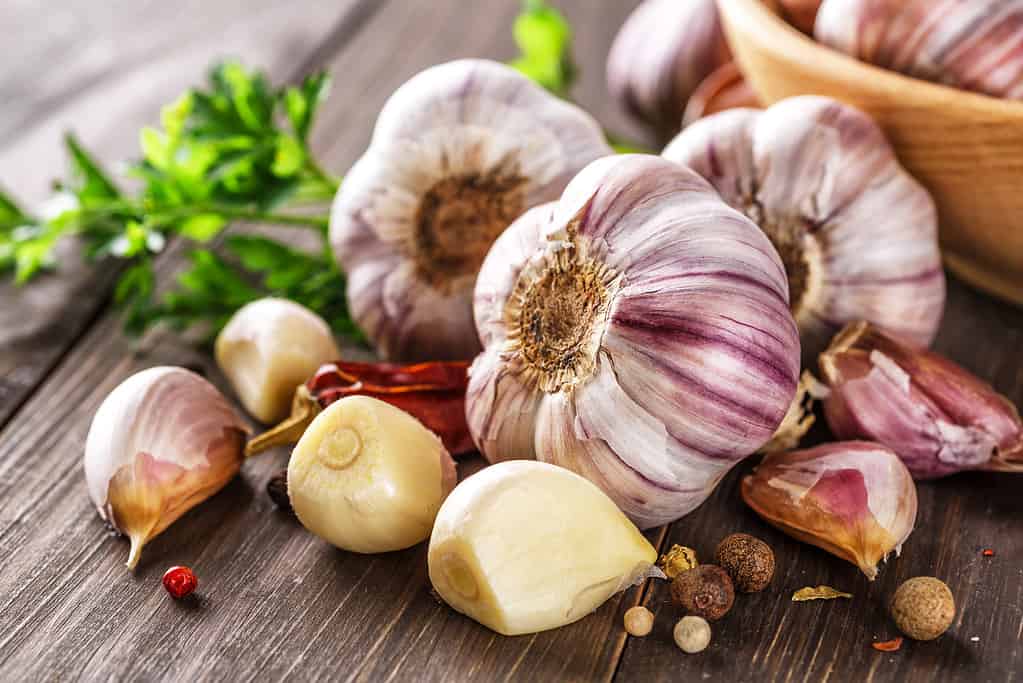
The strong scent of garlic is known to deter crows.
©IURII BUKHTA/iStock via Getty Images
Garlic is believed to repel crows due to its strong odor and taste. Crows have a sensitive sense of smell, and the pungent smell of garlic can be overwhelming for them. When placed in areas where crows gather, such as gardens or crops, the scent of garlic can deter them from landing and foraging for food. Additionally, the taste of garlic can be unpleasant for crows, further discouraging them from returning to the area.
3. Vinegar

The smell and taste of vinegar can repel crows.
©focal point/Shutterstock.com
Vinegar is known to repel crows because of its strong smell and taste. Crows have a keen sense of smell and find the pungent odor of vinegar unpleasant. When vinegar is sprayed or placed in areas where crows gather, such as gardens or fields, it can deter them from landing and foraging for food. The strong taste of vinegar can also discourage crows from returning to the area.
4. Cayenne Pepper
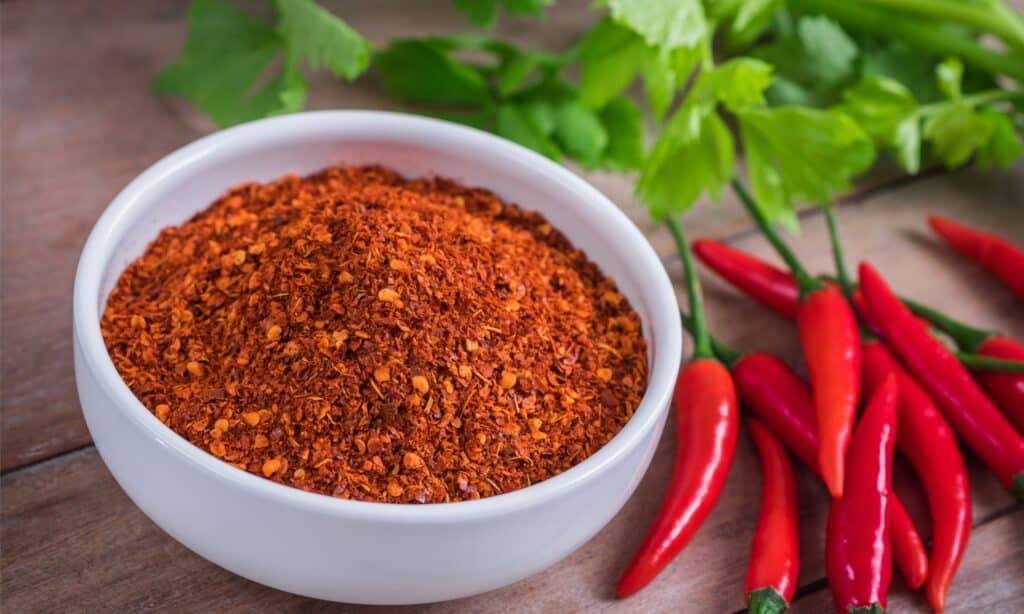
Red pepper flakes, or cayenne pepper, can potentially repel crows.
©iStock.com/Amarita
Cayenne pepper is known to repel crows because of its fiery nature. Crows have a strong sense of taste, and the spicy heat of cayenne pepper can be quite uncomfortable for them. When sprinkled or sprayed in areas where crows gather, such as gardens or crops, the pungent aroma and spicy flavor of cayenne pepper can deter them from landing and causing mischief.
5. Citrus

Bergamot citrus – different types of citruses and their oils can potentially deter crows.
©leonori/iStock via Getty Images
Citrus is known to repel crows because of its strong scent and taste. Crows have a keen sense of smell, and the citrusy aroma can be overpowering for them. When citrus fruits or their peels are placed in areas where crows gather, such as gardens or orchards, the smell can deter them from landing and causing damage. Additionally, the sour and tangy taste of citrus can be unpleasant for crows, further discouraging them from returning.
6. Mothballs

The strong scent of mothballs can deter crows.
©Bowonpat Sakaew/Shutterstock.com
Mothballs are certainly a smell crows hate. They are known to repel crows due to their strong odor. The pungent scent of mothballs is highly unpleasant to crows, causing them to avoid the area where the mothballs are present. The strong smell masks other scents that might attract crows, making the area less appealing to them. By placing mothballs strategically around the desired area, you can deter crows from nesting or gathering in that location. However, it’s important to note that mothballs should be used with caution, as they contain chemicals that can be harmful to humans and animals. It’s advisable to follow the instructions on the packaging and take necessary safety precautions when using mothballs as a crow deterrent.
7. Coffee grounds
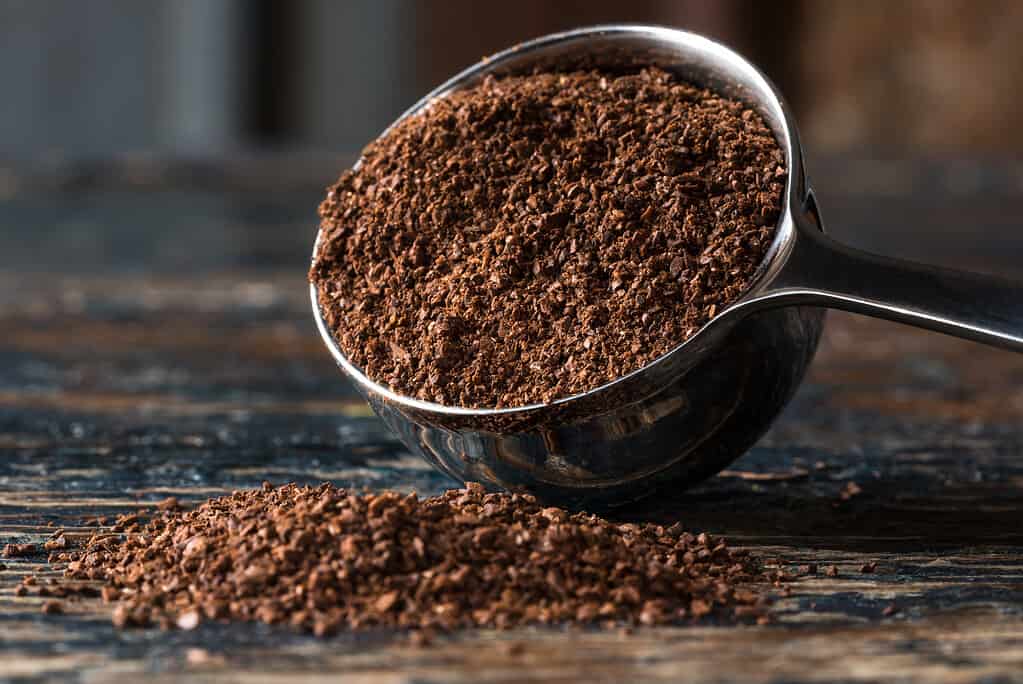
The strong smell of ground coffee can repel crows.
©iStock.com/Michelle Lee Photography
Coffee grounds have been found to repel crows due to their strong odor. Crows are sensitive to smells, and the scent of coffee grounds is unpleasant to them. When coffee grounds are spread around an area, crows are deterred from approaching, reducing the likelihood of damage to crops or gardens. The acidity of coffee grounds also acts as a deterrent, as crows prefer a more neutral pH level. So, if you’re dealing with pesky crows, give coffee grounds a try!
8. Cinnamon
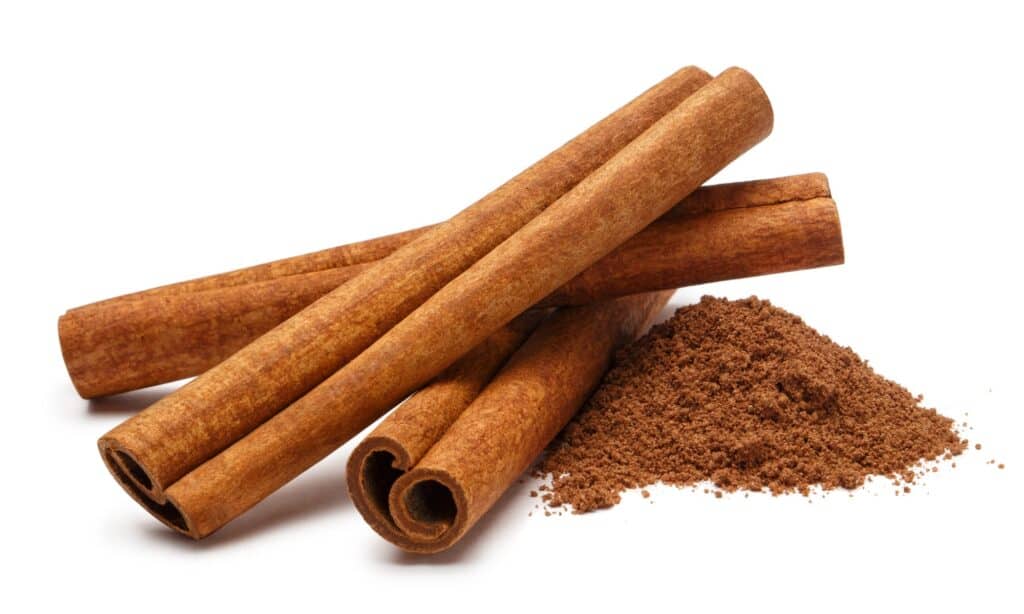
The strong scent and flavor of cinnamon repels crows.
©iStock.com/Marat Musabirov
Cinnamon is believed to repel crows due to its strong scent and taste. The pungent aroma of cinnamon acts as a deterrent, making crows uncomfortable and discouraging them from entering the area. When crows encounter cinnamon, they may perceive it as a potential threat or an unpleasant environment. Therefore, sprinkling cinnamon on surfaces or creating barriers with cinnamon-infused materials can help keep crows away. However, it’s important to note that while cinnamon may be effective in repelling crows, its effectiveness may vary depending on the specific situation and the behavior of the crows involved.
9. Ammonia
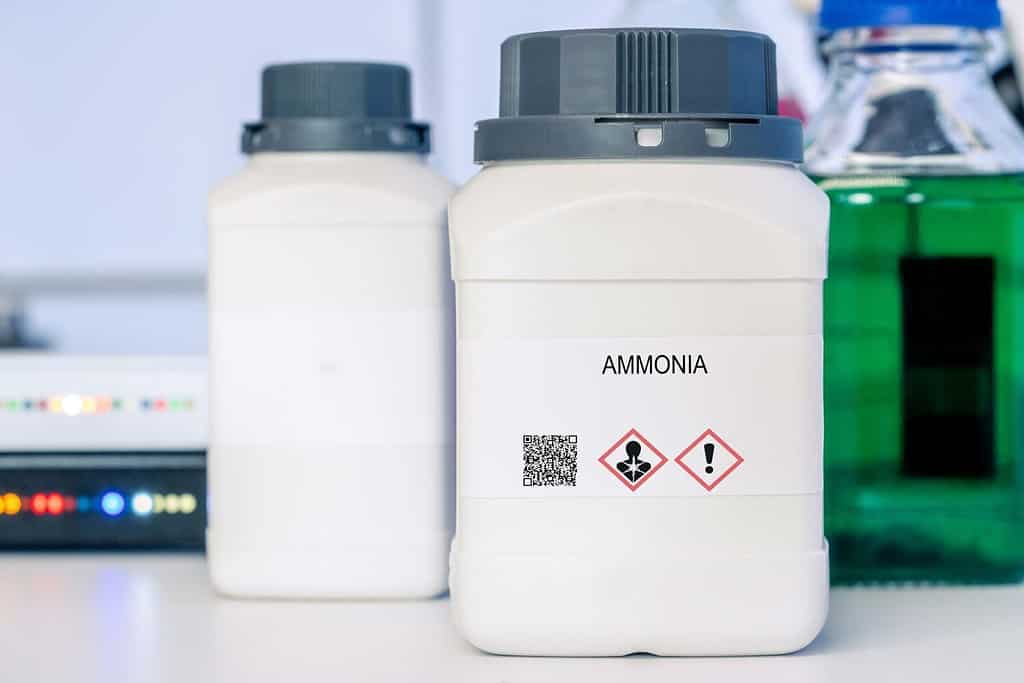
The strong chemical ammonia repels crows but must be used legally and responsibly.
©luchschenF/Shutterstock.com
Ammonia is a naturally occurring compound found in the environment, playing a crucial role in the nitrogen cycle. It is also generated in soil through bacterial activities.
Ammonia is known to repel crows due to its strong odor. The pungent smell of ammonia irritates the sensitive olfactory senses of crows, making them avoid areas where it is present. The strong scent is a natural deterrent that disrupts their feeding and nesting patterns. By using ammonia strategically, such as placing soaked rags or cotton balls near crops or nesting areas, crows can be discouraged from causing damage. However, it’s important to note that while ammonia can be effective in repelling crows, it should be used responsibly and in accordance with local regulations to ensure the safety of humans, animals, and the environment.
10. Predator Urine

Hawks are a common predator of crows, and their urine can help deter crows.
©Dennis Jacobsen/Shutterstock.com
Predatory urine, such as that of predators like wolves, coyotes, or hawks is known to repel crows. It’s not hard to understand why this is one of the smells crows hate. The urine triggers a natural fear response in crows, as they associate it with danger. This instinctual aversion helps keep crows away from areas where urine is present, making it an effective deterrent. So, if you’re looking to keep crows out of your garden or crops, consider using predatory urine as a natural and non-harmful repellent.
To obtain predatory urine, you can try reaching out to local hunters or wildlife management agencies. They may be able to provide you with access to predator urine that has been collected for various purposes, such as trapping or hunting. Alternatively, there are online retailers that specialize in selling predator urine for pest control purposes.
Once you have obtained the urine, you can apply it strategically around your garden or crop area. Place small amounts of the urine near areas where crows tend to gather or feed. The scent will create a deterrent effect, encouraging the crows to stay away and protect your plants.
Remember, predatory urine is a natural and environmentally friendly solution to repel crows. It’s a simple yet effective way to safeguard your plants and keep those pesky crows at bay.
Summary of Smells that Crows Hate
- Peppermint
- Garlic
- Vinegar
- Cayenne Pepper
- Citrus
- Mothballs
- Coffee Grounds
- Cinnamon
- Ammonia
- Predator Urine
Disclaimer
While there is no scientific evidence to fully support using these scents as a crow repellent, many people have reported success in using them. Therefore, trying any one of these can prove to be a natural and non-toxic method to keep crows away, making them worth a try. Also, remember that while these scents may be effective in repelling some crows, it’s important to use a combination of strategies for the best results.
The photo featured at the top of this post is © PosiNote/Shutterstock.com
Thank you for reading! Have some feedback for us? Contact the AZ Animals editorial team.







